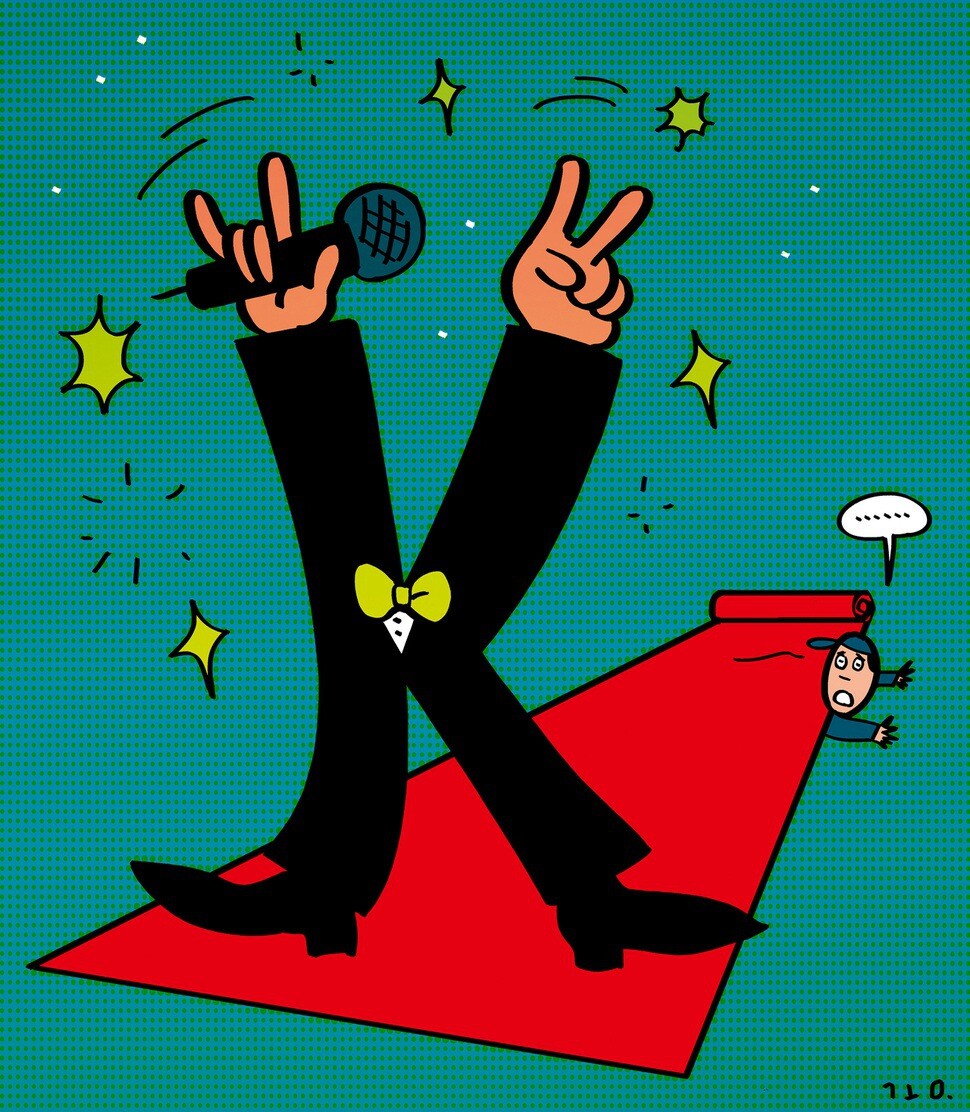hankyoreh
Links to other country sites 다른 나라 사이트 링크
[Column] The “Koreaboos” of Norway and their take on the Korean Wave

These days, I’ve found myself doing something I’d almost never done before. As I’ve taught courses on popular Korean culture, I’ve begun meeting and talking frequently with young Korean popular culture fans, especially in Norway. Young people like them are often referred to in Norway and other Western countries as “Koreaboos.” Koreaboos typically have their first encounter with Korea through K-pop or Korean video games, but the phenomenon isn’t limited to that. At least some of them go on to visit South Korea and study Korean. In a place like Northern Europe where Korean studies is not a major discipline, the Koreaboos are seen as the “potential students” most valued by instructors in the field. That’s why even Korean studies scholars like myself who hold no real personal pastimes in any popular culture – including the Korean Wave – have recently become quite excited about Koreaboo studies.
I will be frank here: I did hold some preconceptions about them before we met. I imagined them as brainless members of the middle class, bewitched by K-pop’s dazzling rhythms and tight choreography or piddling their lives away with computer games. But as I delved deeper into the Koreaboo world, I come to discover something very significant. It turns out that quite a few of them – though not all – are far more critical in their appreciation of Korea than I had expected. Preferring Korean culture to their own in some sense, they showed a higher level of demands than I had imagined for the production of Korean popular culture. As I spoke with them, I discovered that their perspective was not all that different from my own.
My connection to the Korean Peninsula began with a 1958 edition of a Korean language textbook from Kim Il-sung University that I encountered when I passed my college entrance exam in 1989. Later on, I would visit Korea and encounter its popular culture of the 1990s, including the music of Chong Tae-chun and Nochatsa (People Seeking Songs). But the first Korean songs I heard were North Korea’s “The Red Flag” and “Song of General Kim Il-sung.” Since my first exposure came through songs and movies that could be seen as representing North Korean pop culture, I was deeply affected early on by the tragic aspects of the situation in the North. Thirty years ago, when I first saw Order No. 027 – a 1986 North Korean action film that was tremendously popular throughout Eastern Europe – it saddened me deeply to see the film’s realistic depiction of a heavily militarized society. The Koreaboos of Northern Europe, whose first exposure to the Korean Peninsula has likewise come through South Korean pop culture, often think deeply about the issues that come though clearly within examples of that culture.
The Koreaboos’ understanding of K-Pop on a deeper level
The Koreaboos’ attention generally focuses on K-Pop. But their understanding of K-Pop is deeper than I expected – systematic in its own way. They are well aware that the Korean version of rap that made K-pop possible first emerged in the songs of Seo Tai-ji; in many cases, they can even recite the words to the 1995 song “Come Back Home” – occasionally in the original Korean. And so they often ask me: How do it go from the kind of lyrics heard as recently as the mid-1990s, when the sense of rebellion toward society came through with a sense of urgency, to the sort of lyrics we hear today, which bear no connection with any social issues to speak of? By way of a response, I ask them whether it would be reasonable to expect lyrics critical of business from the same groups that are produced as though to order by big entertainment agencies like SM Entertainment. At the same time, both they and I lament the way the lyrics of South Korean pop songs have gradually lost sight of any social agenda.
Many of the Koreaboos I know are young women, so it’s natural that the issue of how women are represented in K-pop would be a matter of major interest to them. While some positive signs of female subjectivity and agency are shown by certain South Korean entertainers such as Lee Hyo-ri, the Koreaboos I’ve spoken to have become ever more dismayed by the recent “girl group” phenomenon. To them, it comes across as patriarchal violence on the part of the entertainment industry when underage pop group members are forced into wearing highly revealing stage costumes. More than anything, though, it’s the very concept of the “adorable and sexy kid sister” that they sense as being ill-suited to an era when gender equality and the expansion of women’s rights are seen as major issues.
The idea of woman having to take beauty points from these “cute” performers – who expose their bodies and seem to demand masculine protection, compared to the virility and dynamism of their male pop star counterparts – may simply seem unnatural to Scandinavian women, who view men and women as not being all that different. But when you think about it, does the way girl groups are produced and marketed by the entertainment business really seem natural or desirable even from a South Korean perspective?
Questions about legal legitimacy of Korea entertainment companies’ slave contracts
There’s another issue that gets raised unanimously by the Korean Wave’s fans at home and overseas, including the “Koreaboos” of Northern Europe. It’s the matter of so-called “slavery contracts,” which can extend for as long as 13 years in serious cases, involve profit distribution rates that could be characterized as exploitive, and include provisions related to the performers’ personal lives that could be seen as violating human rights. Indeed, a number of the Koreaboos I have met know more details than I do about the legal battle 10 years ago between certain members of TVXQ and their agency SM Entertainment. The more they know, the more skeptical they seem to become. One of the questions I most often hear is: “Are these kinds of contracts actually valid under the South Korean legal system, with provisions like ‘dating bans’ that violate the individuals’ basic right to a private life?” In Norway, and in any other country I’m familiar with, a contractual term barring someone from having a love life would be considered utterly invalid and would never stand up legally. How much understanding and sympathy can be expected from the people of the world toward the way “business” is done in K-pop today, where even the performers’ private lives are “marketed” to fans and used as another way for the industry to make money?
Even the big names are exploited by the big business of entertainment; being stars, they are at least richly rewarded. But there’s also a “proletariat” within Korean Wave culture, made up of individuals who play decisive roles in cultural production yet continue to suffer under unfair labor practices for little pay. These are the extras – performers without whom no movies or miniseries could be filmed. Just as the South Korean vehicles and mobile phones that Norwegian consumers use are so often produced by innumerable irregular workers laboring in low-paid, uncertain jobs, so too are the South Korean movies and miniseries beloved among Norway’s Koreaboos produced with the low-paid labor of these often indirectly employed irregular “extras.”
It is not merely a matter of them being paid at the bare minimum hourly rate, either. In the case of television series filming, wages are paid long after the fact; often, people fail to receive any compensation at all for their difficult efforts. In the case of film, an extra who is injured – for example in a battle scene, which is particularly dangerous – has difficulty receiving any compensation or support for medical costs. Indirect employment is a constant companion; the fear that speaking up against an employer today could lead to work drying up tomorrow is an ever-present part of these extras’ lives. Can any conscientious popular culture consumer comfortably enjoy movies or series produced under these circumstances?
Some would view commercial pop culture as the “opiate of the masses” for our times, but its positive role is worth mentioning. It is in many ways fortunate when Northern Europeans are able to grow more familiar with South Korea through its pop culture. But the closer they come to South Korea, the more seriously they come to question the production mechanism behind the Korean Wave, rooted as it is in low wages, uncertain employment, eroticization of female images, and violations of the human beings at the bottom of the industry totem pole. As they come to like South Korea more and more, they will begin to take issues with things like “slavery contracts,” “dating bans,” and the hellish lives of TV series staffers forced to work 15 to 20 hours a day. When it is a product of endless one-sided sacrifices by workers, the Korean boom is unlikely to last long, at least in Northern Europe. For a Korean Wave the world can truly enjoy, we need to start with equality and respect for the human rights of entertainment industry workers.

By Pak No-ja, professor of Korean studies at the University of Oslo
Please direct comments or questions to [english@hani.co.kr]
Editorial・opinion
![[Column] Season 2 of special prosecutor probe may be coming to Korea soon [Column] Season 2 of special prosecutor probe may be coming to Korea soon](https://flexible.img.hani.co.kr/flexible/normal/500/300/imgdb/original/2024/0426/3317141030699447.jpg) [Column] Season 2 of special prosecutor probe may be coming to Korea soon
[Column] Season 2 of special prosecutor probe may be coming to Korea soon![[Column] Park Geun-hye déjà vu in Yoon Suk-yeol [Column] Park Geun-hye déjà vu in Yoon Suk-yeol](https://flexible.img.hani.co.kr/flexible/normal/500/300/imgdb/original/2024/0424/651713945113788.jpg) [Column] Park Geun-hye déjà vu in Yoon Suk-yeol
[Column] Park Geun-hye déjà vu in Yoon Suk-yeol- [Editorial] New weight of N. Korea’s nuclear threats makes dialogue all the more urgent
- [Guest essay] The real reason Korea’s new right wants to dub Rhee a founding father
- [Column] ‘Choson’: Is it time we start referring to N. Korea in its own terms?
- [Editorial] Japan’s rewriting of history with Korea has gone too far
- [Column] The president’s questionable capacity for dialogue
- [Column] Are chaebol firms just pizza pies for families to divvy up as they please?
- [Column] Has Korea, too, crossed the Rubicon on China?
- [Correspondent’s column] In Japan’s alliance with US, echoes of its past alliances with UK
Most viewed articles
- 1‘We must say no’: Seoul defense chief on Korean, USFK involvement in hypothetical Taiwan crisis
- 2After election rout, Yoon’s left with 3 choices for dealing with the opposition
- 3AI is catching up with humans at a ‘shocking’ rate
- 4Why Kim Jong-un is scrapping the term ‘Day of the Sun’ and toning down fanfare for predecessors
- 5[Editorial] Korea’s surprise Q1 growth requires objective assessment, not blind fanfare
- 6Noting shared ‘values,’ Korea hints at passport-free travel with Japan
- 7Two factors that’ll decide if Korea’s economy keeps on its upward trend
- 8Gangnam murderer says he killed “because women have always ignored me”
- 9The dream K-drama boyfriend stealing hearts and screens in Japan
- 10Yoon says collective action by doctors ‘shakes foundations of liberty and rule of law’